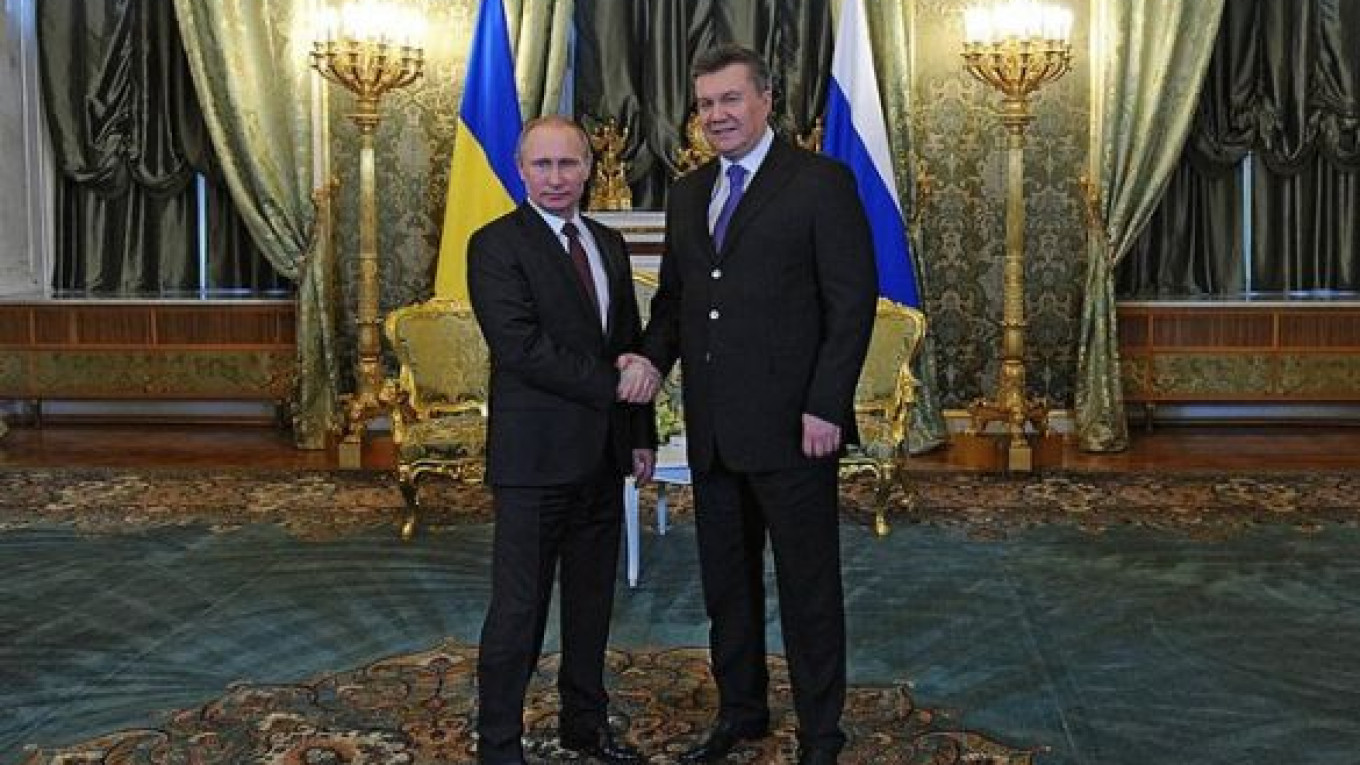President Vladimir Putin does not come across as a politician who would give another sovereign state a chunk of money for free.
On the contrary, during his years at the helm of the Russian politics he has earned a reputation as a shrewd and cunning negotiator, with his role in preventing U.S. military involvement in the Syria crisis being just the most recent case in point.
When Putin told reporters gathered in the stately Kremlin Palace on Tuesday night that Russia's decision to cut the price of gas supplies to Ukraine by one-third and grant the country a $15 billion bailout "was not tied to any conditions," many observers both in Ukraine and in Russia did not believe him. ?
"It is clear that Yanukovych has surrendered significant economic assets in exchange for the deal. For three years, Putin refused to give any concessions and then suddenly he granted them all," said Alexei Garan, director of the School of Policy Analysis at the Kiev-Mohyla Academy.
"We have no doubts that secret protocols exist, and Yanukovych has promised him something substantial," he said.
President Viktor Yanukovych backed away from signing a deal that would have established a free- trade zone between Ukraine and the European Union at the eleventh hour on Nov. 29. Russian leaders have repeatedly said they would respect Ukraine's ultimate choice, but that a free-trade agreement with the EU would necessarily end the preferential trade regime between the two countries, in order to prevent Ukraine from becoming a transit corridor for European goods onto the Russian market.
This would have caused serious harm to the Ukrainian economy and has pushed Yanukovych toward dealing with Moscow. Exerting pressure in the opposite direction, Yanukovych has had to face thousands of pro-EU protesters, who have occupied central Kiev for more than three weeks and refused to leave until the president or his government resigns.
Among the obvious Russian conditions mulled by many experts and feared by protesters on Kiev's Independence Square is Ukraine's accession to the Moscow-led Customs Union with Kazakhstan and Belarus.
The two sides claimed they had not even discussed the issue and that Russia's help to Ukraine was a sign of brotherly relations between the two countries.
"Russia has lent a hand to Ukraine not just in word, but in deed," Valentina Matviyenko, head of the Federation Council told Interfax.
In the aftermath of Tuesday's deal, analysts in Ukraine were skeptical of Russia's goodwill.
"Everything will continue to depend on how kind Putin is. I believe that any sane Russian understands that Vladimir Putin does not feel brotherly feelings toward anybody," Garan said.
Russia's Finance Minister Anton Siluanov revealed the rationale behind the agreements signed, telling Reuters that Russia "only won from them," pointing out that if the Ukrainian economy collapsed, Russia's would suffer too.
"We understand the need to support our neighbor, as we have very tight trade and economic relations," he said.
Members of the Ukrainian opposition were more blunt in their assessment.
"This reminds me of curing an alcoholic with another portion of vodka," said Sergei Sobolev, a deputy in the Rada — the Ukrainian parliament — and a member of the opposition Batkivshchyna party.
Sobolev predicted that the $15 billion bailout will only cover Ukraine's budget deficit in the current year, and that Yanukovych will be forced to plead for money again in 2014.
And the boon of discounted gas prices is not as clear-cut as it seems, Sobolev said, as Russia can change them whenever it wants. Indeed, Putin said on Wednesday that the gas arrangement was temporary.
In addition, the negative effects of lower gas prices on Gazprom's revenues can be cushioned by increases in the volume of gas purchased.? Eduard Stavistky, the Ukrainian Energy Minister, has already said the country plans to buy more Russian gas next year than in 2013.
Ukraine might not have joined the Customs Union, but it still allowed Russia to win another victory against the West, said Konstantin Bondarenko, head of the Ukrainian Politics fund, a Kiev-based think-tank.
"Putin got a lot of advantages. Ukraine will inevitably move closer to Russia economically and politically," he said. "Putin can now call it an ally."?
Contact the author at [email protected]
A Message from The Moscow Times:
Dear readers,
We are facing unprecedented challenges. Russia's Prosecutor General's Office has designated The Moscow Times as an "undesirable" organization, criminalizing our work and putting our staff at risk of prosecution. This follows our earlier unjust labeling as a "foreign agent."
These actions are direct attempts to silence independent journalism in Russia. The authorities claim our work "discredits the decisions of the Russian leadership." We see things differently: we strive to provide accurate, unbiased reporting on Russia.
We, the journalists of The Moscow Times, refuse to be silenced. But to continue our work, we need your help.
Your support, no matter how small, makes a world of difference. If you can, please support us monthly starting from just $2. It's quick to set up, and every contribution makes a significant impact.
By supporting The Moscow Times, you're defending open, independent journalism in the face of repression. Thank you for standing with us.
Remind me later.


